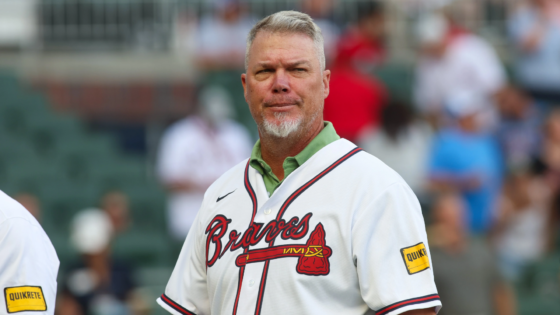It started as a casual scroll through the latest Hall of Fame chatter, watching names and arguments bounce around the baseball world. Then came another round of voting results, and another glaring omission. That was the breaking point. Chipper Jones has never been one to hold back. This time was no exception. He came out swinging in defense of a Red Sox hero who’s won three World Series titles. What could’ve been a regular off-season lapse suddenly turned into a deep conversation. That, too, about respect and how baseball treats its legends.
The subject? Curt Schilling, the fire-breathing right-hander with three World Series rings to his name and a postseason résumé that reads like folklore. To Jones, Schilling’s place in Cooperstown should never have been in question. He faced him. He bled against him. And in those shadows, he saw more than just raw talent; he saw someone who could keep going when others tired out. The stats are pretty mind-boggling: 216 wins, over 3,100 strikeouts, six All-Star appearances, and a postseason ERA that’s ridiculously low at 2.23. To put it simply, this guy was a force to be reckoned with when it mattered most. But somehow, the plaque still isn’t.
That frustration came to the surface when a post from @OleTimeHardball went viral on August 7, posing a hypothetical to fans: “You hold the deciding vote in the Hall of Fame case for Curt Schilling. Does he get in?” Jones, never one to sugarcoat, fired back instantly: “Yep!” When a first ballot Hall of Famer gives you a stamp of approval, it’s a deal. This time, it fired up an argument that’s been brewing for years. It brought up an uncomfortable reality: despite all the accolades, Schilling is still missing from Cooperstown.
— Chipper Jones (@RealCJ10) August 7, 2025
It’s hard to argue against Schilling’s on-field resume. He didn’t just pitch in big games; he rewrote October. Whether it was the bloody sock in Boston or his World Series heroics in Arizona, Schilling delivered under pressure with machine-like consistency. His 11–2 postseason record is a clinic in playoff poise. Throw in those three 20-win seasons and his incredible run as co-MVP of the 2001 World Series, and the debate over his qualifications starts to feel more questionable.
And that’s where things get messy. Schilling’s off-field persona, loud, polarizing, and often controversial, has rubbed fans the wrong way. But Chipper’s response strips the noise out of the argument. It’s not about likability. It’s about legacy. About showing up when the lights are brightest and the moment is biggest. And by every baseball standard that matters, Schilling’s already earned his bronze.
Like we said, Jones didn’t make a speech. He didn’t need to. His voice, even in its quietest form, carried a message loud enough for Cooperstown’s walls: This guy belongs.
The Hall of Fame’s identity crisis: legacy or likability?
There was a time when numbers told the whole story. Wins, WAR, home runs, postseason dominance, if your stats roared loud enough, you got in. But now? Being great just isn’t good enough anymore. The Hall of Fame, which used to be an honor for baseball players, has changed its way of thinking. Guys like Curt Schilling and Barry Bonds, who were unbelievable on the field, still can’t get in. Not because of how they were on the field, but it’s their off-field behavior. And that shift is making fans and even former players question what the Hall really stands for.
Just ask Bonds. In 2023, the all-time home run king, seven-time MVP, and eight-time Gold Glove winner made it painfully clear: “I was vindicated. I went to the court, I was in federal court, and I won my case, 100%.” He wasn’t venting over awards or attention. He was pleading for recognition in the sport he once ruled. Recently, he shared an Instagram post featuring ten athletes who had been blackballed from their sports, his face among them. It wasn’t subtle. Bonds were hinting. The exclusion hurts. Seventeen years after his final at-bat, the silence from Cooperstown still speaks louder than all 762 home runs.
But lately, Bonds seems to be trying to move forward. During his induction into the Pittsburgh Pirates Hall of Fame, he quietly buried the hope that once burned inside him: “I don’t have to worry about those things anymore… Those hopes, I don’t have them anymore. I hope to breathe tomorrow [and see] if I can make it to 61.” That line hit with the weight of a man who’s made peace, but not without scars. Bonds’ case and Schilling’s expose the Hall’s identity crisis. Is it a museum of baseball’s most talented, or a character court that filters legends through public opinion? Because if legacy can be sidelined by likability, then the Hall might need to redefine what it honors.
The post Chipper Jones Makes Strong Case for Red Sox’s 3X World Series Champion as Painful MLB Snub Resurfaces appeared first on EssentiallySports.
